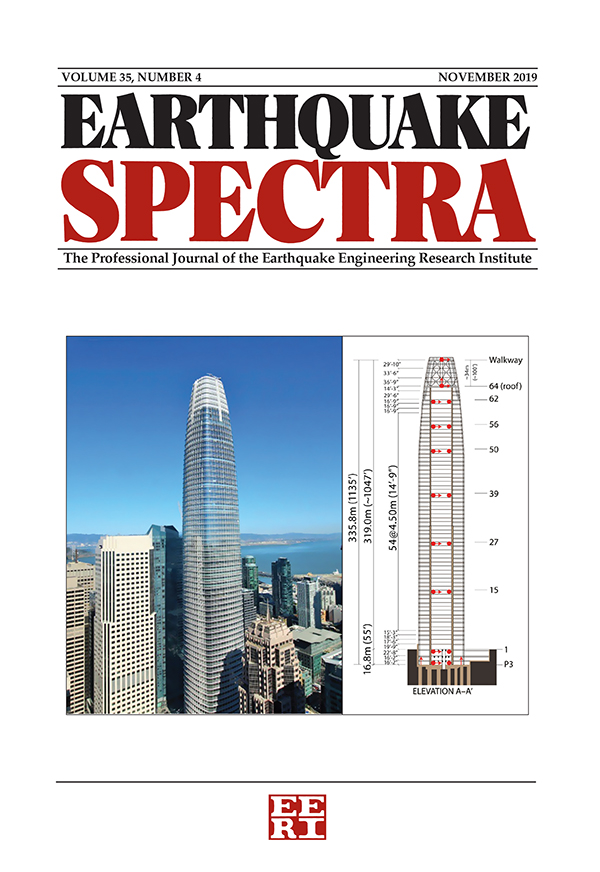CLT耦合墙体体系的多因素地震易损性评价
IF 3.7
2区 工程技术
Q2 ENGINEERING, CIVIL
引用次数: 1
摘要
交叉层合木偶联墙(CLT-CW)体系是最近提出的一种基于木材的结构体系,人们对其抗震性能的认识有限。现有的CLT建筑概率地震易损性评估(PSFA)研究存在一定的空白,特别是在综合评价CLT- cw系统及其各种设计参数的影响方面。为了充分描述结构的震后性能状态,最新的研究建议使用多变量易损性分析。因此,本文提出了CLT-CW系统的双变量PSFA,使用两个工程需求参数:最大层间漂移比和剩余层间漂移比。针对加拿大不列颠哥伦比亚省温哥华的地震活动性,对11座原型建筑进行了评估,考虑了不同的设计参数:耦合比、耦合梁剪力剖面、CLT墙配置、建筑层高和延性相关地震力修正系数。在OpenSees中开发了系统的二维数值模型,并使用30个地面运动记录进行了增量动态分析。利用三种极限状态能力和三种极限状态函数组合,建立了概率地震易损性曲线。比较了不同极限状态函数组合下的脆性曲线,探讨了不同设计参数对脆性曲线的影响。这项研究有助于更深入地了解CLT-CW系统的抗震性能,帮助工程师和研究人员评估地震风险和开发地震弹性结构。本文章由计算机程序翻译,如有差异,请以英文原文为准。
Multi-variate seismic fragility assessment of CLT coupled wall systems
The cross-laminated timber coupled wall (CLT-CW) system, a recently proposed timber-based structural system, has limited understanding of its seismic performance. The existing research in probabilistic seismic fragility assessment (PSFA) of CLT buildings reveals gap, particularly regarding comprehensive evaluation of CLT-CW systems and the impact of its various design parameters. To fully describe the state of the post-earthquake performance of structures, state-of-the-art studies recommend using multi-variate fragility analysis. Accordingly, this article presents a bi-variate PSFA of CLT-CW systems using two engineering demand parameters: the maximum and residual inter-story drift ratios. For the seismicity of Vancouver, British Columbia, Canada, 11 prototype buildings are evaluated considering different design parameters: coupling ratio, coupling beam shear force profile, CLT wall configuration, building story height, and ductility-related seismic force modification factor. Bi-dimensional numerical models of the systems are developed in OpenSees, and incremental dynamic analyses are performed using 30 ground motion records. Three limit state capacities and three limit state function combinations are utilized to develop probabilistic seismic fragility curves. The fragility curves under the different limit state function combinations are compared, and the effect of the different design parameters is investigated. This study contributes to a deeper understanding of the seismic performance of CLT-CW systems, assisting engineers and researchers in assessing seismic risk and developing seismic-resilient structures.
求助全文
通过发布文献求助,成功后即可免费获取论文全文。
去求助
来源期刊

Earthquake Spectra
工程技术-工程:地质
CiteScore
8.40
自引率
12.00%
发文量
88
审稿时长
6-12 weeks
期刊介绍:
Earthquake Spectra, the professional peer-reviewed journal of the Earthquake Engineering Research Institute (EERI), serves as the publication of record for the development of earthquake engineering practice, earthquake codes and regulations, earthquake public policy, and earthquake investigation reports. The journal is published quarterly in both printed and online editions in February, May, August, and November, with additional special edition issues.
EERI established Earthquake Spectra with the purpose of improving the practice of earthquake hazards mitigation, preparedness, and recovery — serving the informational needs of the diverse professionals engaged in earthquake risk reduction: civil, geotechnical, mechanical, and structural engineers; geologists, seismologists, and other earth scientists; architects and city planners; public officials; social scientists; and researchers.
 求助内容:
求助内容: 应助结果提醒方式:
应助结果提醒方式:


